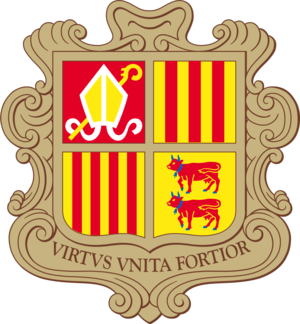Co-Prince of Andorra
(Prince) | |
|---|---|
 | |
| Start | 1278 |
| Jointly the heads of state of the Principality of Andorra | |
The co-princes of Andorra are jointly the heads of state of the Principality of Andorra, a landlocked microstate lying in the Pyrenees between France and Spain. Founded in 1278 by means of a treaty between the bishop of Urgell and the Count of Foix, this unique diarchical arrangement has persisted through medieval times to the 21st century. Currently, the bishop of Urgell and the president of France serve as Andorra's co-princes, following the transfer of the count of Foix's claims to the Crown of France and, thence, to the president of France.
Contemporary political role
The 1993 Constitution of Andorra carefully defines the exact role and prerogatives of the co-princes of Andorra today. The constitution establishes Andorra as a "parliamentary coprincipality",[1] providing for the president of France and bishop of Urgell to serve together as joint heads of state. The constitution distinguishes between which powers they may exercise on their own (Article 46), and which require the countersignature of the head of the Andorran government, or the approval of the "Síndic General", the Andorran legislature (Article 45).
Powers the co-princes may exercise on their own include:[2]
- Joint exercise of the "prerogative of grace" (the power to pardon);
- Each co-prince may appoint one member of the Superior Council of Justice and one member of the Constitutional Tribunal;
- Establishment of such services as they deem necessary to fulfil their constitutional prerogatives, and appointment of individuals to fulfil these services;
- Requesting a preliminary judgement about the constitutionality of proposed laws, or of international treaties;
- Agreeing to the text of any international treaty, prior to submitting it for parliamentary approval;
- Bringing a case before the Constitutional Tribunal in the event of any conflict over the exercise of their constitutional prerogatives.
Powers the co-princes may exercise in conjunction with the head of government include:[3]
- Calling for elections or referendums in accordance with constitutional provisions;
- Appointing the head of government in accordance with constitutional provisions;
- Dissolve the General Council (the Andorran legislature) prior to the expiration of its current term (but not until at least one year has passed since the prior election);[4]
- Accrediting diplomatic representatives from Andorra to foreign states, and receive credentials of foreign representatives to Andorra;
- Appointing office-holders in accordance with appropriate constitutional provisions;
- Sanctioning and enacting laws in accordance with constitutional provisions;
- Granting formal consent to international treaties, once ratified by the General Council.
Each co-prince is granted an annual allowance by the General Council to dispose of as he or she sees fit.[5] Each appoints a personal representative in Andorra,[6] and in the case of incapacitation of one of them, the constitution provides for the other prince to govern in his or her absence, with the concurrence of the Andorran head of government or the General Council.[7]
Certain treaties require the participation of the co-princes (or their designated representatives) in their negotiation process as well as their final approval; these are detailed in Articles 66 and 67 of the constitution.
The co-princes jointly retain the right to propose amendments to the constitution; this same right rests with the General Council.[8] They have no veto power over legislation passed by the General Council, though they do retain a veto over certain international treaties, as described above.
Office Holders on Wikispooks
| Name | From | To | Description |
|---|---|---|---|
| Emmanuel Macron | 14 May 2017 | Serving with Joan Enric Vives Sicília | |
| François Hollande | 15 May 2012 | 14 May 2017 | Serving with Joan Enric Vives Sicília |
| Nicolas Sarkozy | 16 May 2007 | 15 May 2012 | Served with Joan Enric Vives Sicília |
| Jacques Chirac | 17 May 1995 | 16 May 2007 | |
| François Mitterrand | 21 May 1981 | 17 May 1995 | |
| Valery Giscard d'Estaing | 27 May 1974 | 21 May 1981 | |
| Georges Pompidou | 20 June 1969 | 2 April 1974 | Died in office of a rare form of cancer |
| Charles de Gaulle | 8 January 1959 | 28 April 1969 |